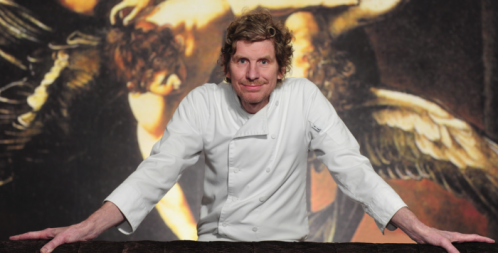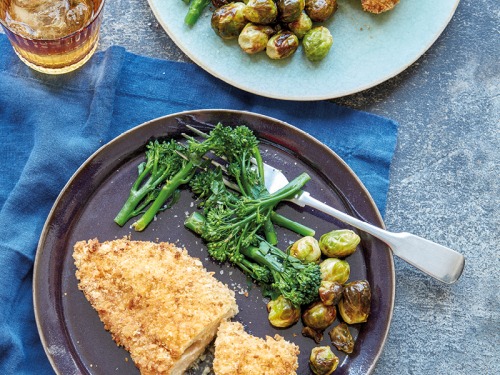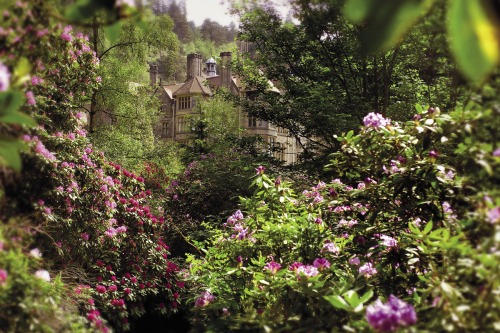Meet the North East's Top Chef, Terry Laybourne

We met Terry Laybourne in our first edition. He was at the top of the North East culinary tree then and he remains there now, though he doesn’t admit it himself. We went back to catch up with him, 20 years on…
The significance of the hospitality sector should never be underplayed and it’s with this in mind that I’m now wandering down the Newcastle Quayside to catch up with Terry. He has three venues in this neck of the woods: his flagship and eponymous casual fine dining haunt, 21; his pub and eatery, The Broad Chare; and another venue which has recently experienced a tasty makeover, St Vincent.
It’s here that we arrange to meet and as I arrive slightly early, I do a little people watching and study the new look. It’s fun, relaxing and, for 11.30, pretty busy too. It’s the sort of place you can pop into for a quick coffee or equally, enjoy a long lunch or dinner. I like it.
As I sip on an Americano, my host appears. He sits opposite with the same old friendly smile, and I would say these past 20 years have treated him well. So, what’s kept him at the tip of the top table?
We agree the crucial ingredients remain as critical and fresh today as they always have been, and are as applicable to publishing as they are to running a decent restaurant. ‘Quality, consistency, and hard work,’ he says. There are of course, other key factors: timing and service, for example, but essentially, you’re only as good as your last dinner/publication.
But I’m keen to understand what else has kept him going. ‘I’ve still got an inquisitiveness. I love seeing new places and getting a reaction, a feeling of: yes, I’d like to do something like that. Then I ask myself: can I achieve it? And does it have a place in our neighbourhood? I guess I just have to keep my mind stimulated.’
As ever, Terry talks lucidly but with thought. He continues; ‘The downside is you’re never truly contented, you never feel you’ve fully achieved, always wanting something different, something more.’ I suspect a number of readers will share these feelings and, perhaps, his frustration. But it’s not greed, more an insatiable desire, and it’s a drug too. But thank God for it – it keeps the world exciting and ever-changing.
Clearly Newcastle has changed. The architecture on both flanks of the Tyne is just one example, but it’s a constantly evolving scene. ‘In the last year, the street beyond the Crown Posada (on The Side) has been brought back to life. It’s an area for the bright young things. The universities play a serious part, but next year it may be somewhere else,’ Terry explains.
However, as recent closures have demonstrated, not all is well for restaurants, especially, perhaps, for some of the mid-market chains. Terry seems to agree: ‘there are too many and they are just too much of a muchness. That said, the overall offer is far better here than it has ever been.’
When it comes to where to eat, I’m interested to know which are his current favourites. Never an easy question. But he thinks… dismissing several, and is mildly frustrated that he may have missed a few. ‘It’s good to see Mark Lagun back at the Earl of Pitt Street. I enjoy Cal’s Own, and I really like Patricia (both in Jesmond).
Bradley Gardens is a special place in the Tyne Valley, demonstrating that it’s about the whole package that is being presented. One of my old chef’s, Pla (Parichat) is doing well at Sohe (also in Jesmond). And both Route (The Side) and The Staith’s House (North Shields) are good.
Adam Riley is doing some quite marvellous food on King Edward’s Bay at Riley’s Fish Shack (Tynemouth), and it’s brilliant to see Colman’s (South Shields) make the leap with the next generation – getting a new place, taking the risk and making the commitment. Anna Hedworth at Cook House has also followed her dream and I’m sure there’s more…’
Although Laybourne was the first to hold a Michelin star in Newcastle, it came and went as his food philosophy changed, and it’s this more relaxed line of thinking which he favours today. ‘The current crop have brought a new level of expertise, but it’s not really for me.
Maybe it’s similar to Formula One, where the level of technical expertise is exceptional and nailed down to perfection, but I find it boring. I think in the late '60s when there were skinny tyres, less power, and for most of the lap the driver was out of control, it was much more exciting!’ He smiles at his analogy, but as with most sporting analogies, it needs some qualification. ‘That’s not to say I don’t appreciate that level of expertise. It’s just not for me. I’m more interested in places that stimulate your soul and your mind.’
From Geordie wannabe-chef to a philosopher of food, Laybourne has come a long way. The good news is that the journey seems far from over. To give his thoughts an element of reality, he cites a restaurant he’s just been to in Berlin which, ironically, does have a Michelin star: the surprisingly-named Cookies Cream. ‘If you think you’re lost, you’re almost there is what they say when giving directions. It’s in a place you wouldn’t believe, but the anticipation is brilliant.
I don’t suppose they spent more than £30 on the fit out!’ He smiles and continues; ‘The staff are edgy, the food’s great, and it was a truly memorable experience.’ All that in a vegetarian restaurant. So what, I ask him, of the vegetarian/vegan phenomenon?
‘Vegan is really here to stay. People are really taking it seriously, especially educated females. We haven’t taken vegetarians seriously enough for too long, we’ve got to start. In fact, it’s my mission for the year.’
I smile to myself when I think of The Broad Chare, his excellent pub-restaurant that nestles a few doors up. It’s a meat-lovers heaven, but variety is clearly the spice of life and the culinary road can go in many directions. So where is his going?
‘I don’t know where the journey goes. A new restaurant is unlikely. I might do another pub, if the right opportunity came up, but my ambition is to take the summer off.’ In addition to his restaurants, Terry has been busy in Fenwick – not shopping, but, together with a progressive team there, revitalising a potentially sedentary space with a new, vibrant food hall, boasting a variety of excellent eateries. He has also worked with the Lakes Distillery in Cumbria, overseeing their food offering. It seems he’s certainly not taking it easy.
‘When I stopped cooking I needed to keep stimulating my mind,’ he continues. ‘You have to keep striving, keep agile, but it probably would’ve been cheaper if I’d stayed in the kitchen!’ Once again, he smiles, and quickly adds, ‘but I have no regrets.’
In the last 20 years, the hot topics have often revolved around local produce and seasonality. In a changing world, these words have sometimes become overused and are almost excuses, rather than reasons for how a chef might serve their community.
At which point, he starts to dream: ‘If I could do it all again, I would be in a country house, grow lots in the garden, plan menus over the breakfast table based on what’s fresh in the garden, then I’d go to the market. I’d have a coffee and chat and buy all I needed.’
He wakes up from his restaurant reverie and adds, more realistically: ‘but, do you know, sometimes local produce just isn’t good enough. It’s almost impossible to produce without the scale and the infrastructure.’ From romantic to realist within a minute.
In a similar way, his journey has witnessed dramatic change. ‘When I was at The Fisherman’s Lodge, we changed everything,’ he explains. ‘Sourcing and making all sorts, including a variety of breads. Now the city has some really good bakers.
We still have our own bakery, it’s not commercial, but it keeps it real. The standards of local produce, in many ways, have grown alongside the changing restaurant scene. I came home between seasons in Switzerland and France (where he was building his knowledge many years ago) and worked in one of Newcastle’s finest restaurants (The Fisherman’s Wharf) – there wasn’t a piece of fresh fish in the place.
Mussels were pre-cooked, I was 21, and after cooking here, it became my mission to change things.’
That was then and, today, he still has a huge amount to give, despite what he says. ‘I’m yesterday’s man.
When Kenny (Atkinson, of House of Tides) got his star, I thought: well done son, and also – thank God!’ At this point, he confirms, Kenny is another who has done great things. He is also interested to see how Danny Parker does at Jesmond Dene House, one of his old haunts and still one he favours. ‘It deserves a good restaurant, I really hope he does well.’
So, the world moves on. We talk London, New York, Paris, and Corbridge. He’s in his early 60s, but he remains razor sharp, and I am convinced there’s more to come. But you can’t underestimate the challenge: ‘New projects take so much time if you’re going to get them right,’ Terry confirms, ‘I want to reaffirm 21, but if an irresistible opportunity presents itself, well…’ Clearly it’s a question of watching this space.
The journey has already been extraordinary. There have been restaurant closures along the way – a restaurant is a business after all, things change, and new opportunities arise – but from the The Lakes to St Vincent, and from Fenwick to The Broad Chare, the 21 story continues.
As I prepare to leave, Chef Laybourne remains sanguine and thoughtful. ‘A restaurant should serve the community. The Broad Chare is a local, as well as a place to eat, and 21 is a place which offers great entertainment as well as food,’ he says with passion.
He’s right, and I feel confident that there’s not just more wisdom to come from this master chef, but action, too. With the popularity of chefs in the media – they have been compared to stars of stage and sport –it’s relevant that I leave you with this insight from Terry: ‘One day Roger Daltrey came in with a couple of others and I joined them; four old blokes having lunch.
'We talked about the world, about getting old, giving up, moving on and Roger (he of The Who, aged 74), when asked about retirement, said, “it’s what I do, why on earth should I stop?”’
Terry will want to ensure that all his eateries stay at the top of their particular tree, but I for one feel sure that there’s more fruit to come from the labours of someone who has done more than any other to put the North East on the culinary map.
As I reflect, walking back past restaurants of all shapes and sizes, I also consider a series of facts he told me – of his six managers, six head chefs, the group pastry chef, two operations managers and the retail manager all but one have risen through the ranks. Laybourne has never been yesterday’s man, and the future looks bright indeed.













